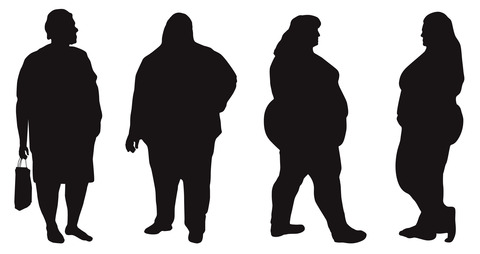
Signs of American culture, ranging from fast food to Hollywood movies, can be seen around the world. But now anthropologists have discovered a far more troubling cultural export from the United States: stigma against fat people.
Negative perceptions about people who are overweight are becoming the cultural norm in many countries, including places where plumper, larger bodies traditionally have been viewed as attractive, according to a new report in the journal Current Anthropology. Although some of the shift in thinking most likely is explained by idealized slim body images promoted in Western advertising and movies, the emergence of fat stigma around the world may also result from public health efforts to promote obesity as a disease and a worrisome threat to a nations health.
Researchers from Arizona State University studied cultural attitudes about weight in 10 different countries, territories and cities, including American Samoa, Tanzania, Mexico, Puerto Rico, Paraguay, Argentina, New Zealand, Iceland, two sites in Arizona and London. Using mostly in-person interviews, supplemented with questions posed over the Internet, they asked nearly 700 people to answer true or false to a variety of statements designed to determine the local zeitgeist about weight and body image.
The fat stigma test included statements like, People are overweight because they are lazy, or A big woman is a beautiful woman.
Alexandra Brewis, executive director of the universitys School of Human Evolution and Social Change and the studys lead author, said she fully expected high levels of fat stigma to show up in the groups tested in the United States, London and New Zealand, as well as in body-conscious Argentina. But what she didnt expect was the strong negative attitudes about weight in the other cultures. The results, she said, suggest a surprisingly rapid globalization of fat stigma.
The change has come very, very fast in all these places, said Dr. Brewis. Of all the things we could be exporting to help people around the world, really negative body image and low self-esteem are not what we hope is going out with public health messaging.
Surprisingly, scores were high in Puerto Rico and American Samoa, as well as along the Mexican border and in Paraguay, places that have historically held more positive views of larger bodies. These cultures traditionally view bigger women, in particular, as fertile, generous and desirable, said Dr. Brewis.
The study didnt measure the reasons behind the cultural perceptions. But the rapid change in attitudes in recent years suggests that a public health campaign against obesity is at least partly responsible for the increased stigmatization of people who are overweight.
In a lot of these societies, obesity was not seen as an unhealthy state historically, she said. We do know in the West that health professionals, in particular, tend to be very fat stigmatizing. Now, in places like American Samoa, there has been a lot of discourse around obesity, and a lot of the negative health messages have a lot of negative moral messages that go with them.
Marianne Kirby, who writes the fat acceptance blog TheRotund.com, said the findings were not surprising, given the global push to brand obesity as a major health threat.
The fundamental message were putting into the world is that fat people deserve shame for their own health, said Ms. Kirby, co-author of the book, Lessons From the Fat-o-Sphere. Weve been pushing this message for a long time. I dont think anyone is immune to it.
The study doesnt shed light on whether people in Asia or Arab countries report similar levels of fat stigma, and a larger sample size would probably yield additional insights about the countries studied. In addition, the research was designed only to detect cultural views of obesity and didnt show whether people are experiencing more social or workplace discrimination as a result of the growing fat stigma.
I think the next big question is whether its going to create a lot of new suffering where suffering didnt exist before, said Dr. Brewis. I think its important that we think about designing health messages around obesity that dont exacerbate the problem.
Source: http://well.blogs.nytimes.com/2011/03/30/spreading-fat-stigma-around-the-globe/?hp
